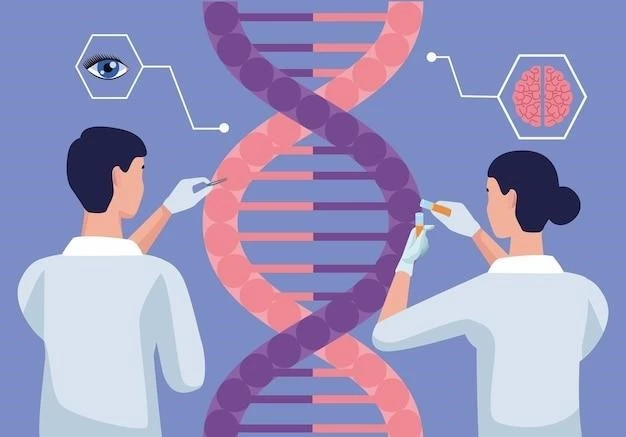Article Plan⁚ Disease ⸺ Purtilo Syndrome
Introduction to Purtilo Syndrome

Purtilo Syndrome, also known as X-linked lymphoproliferative syndrome, is a rare genetic disorder primarily affecting males. It was first identified in the mid-1970s by David Purtilo and colleagues in the Duncan kindred. This syndrome is characterized by severe immune dysregulation, often triggered by infections like the Epstein-Barr virus (EBV).
Individuals with Purtilo Syndrome face challenges in regulating their immune response, leading to increased susceptibility to infections and the development of various complications. The establishment of the X-Linked Lymphoproliferative Syndrome Registry has provided a platform for collecting data and enhancing understanding of this rare disorder.
Throughout the years, research has shed light on the genetic basis of Purtilo Syndrome, emphasizing the role of mutations in specific genes, such as SH2D1A and XIAP. Advances in diagnosing and treating the syndrome have improved patient outcomes and quality of life.
Support and resources are vital for individuals and families impacted by Purtilo Syndrome, offering guidance, assistance, and a sense of community. Despite the challenges it presents, ongoing research and medical innovations offer hope for improved management and potentially, a better future for those affected by this rare genetic disorder.
History and Discovery of Purtilo Syndrome
Purtilo Syndrome, also known as X-linked lymphoproliferative syndrome or Duncan Disease, was first identified in 1974 by David Purtilo and his colleagues in the Duncan kindred. The syndrome is characterized by severe immune dysregulation, often triggered by infections like the Epstein-Barr virus (EBV).
The Duncan family history revealed several males who succumbed to a lymphoproliferative disorder, showcasing the genetic nature of the condition. Further investigations led to the recognition of two subtypes of X-linked lymphoproliferative disease, XLP1 (Duncan Disease or Purtilo Syndrome) and XLP2.
Mutations in genes such as SH2D1A and XIAP are associated with X-linked lymphoproliferative syndrome٫ contributing to immune system deficiencies and a heightened risk of severe reactions to viral infections.
Over the years, the establishment of the X-Linked Lymphoproliferative Syndrome Registry and ongoing research initiatives have deepened our understanding of this rare disorder. The history and discovery of Purtilo Syndrome have paved the way for advancements in diagnosis, treatment, and support for individuals and families affected by this genetic condition.
Genetic Basis of Purtilo Syndrome
Purtilo Syndrome, also known as X-linked lymphoproliferative syndrome, is primarily caused by mutations in specific genes like SH2D1A and XIAP. These genetic alterations result in immune system deficiencies, impacting individuals’ ability to respond effectively to infections, particularly the Epstein-Barr virus (EBV).
X-linked lymphoproliferative syndrome (XLP) is a rare disorder linked to the X chromosome, predominantly affecting males. The syndrome’s genetic basis leads to anomalies in immune cell function, increasing the risk of severe reactions to viral infections.
The establishment of the X-Linked Lymphoproliferative Syndrome Registry facilitated the identification of cases and unusual complications associated with this genetic condition. Through genetic testing and advancements in understanding the molecular basis of Purtilo Syndrome, targeted interventions and personalized treatments can be developed to manage the disorder.
Understanding the genetic underpinnings of Purtilo Syndrome is crucial for enhancing diagnostic strategies, treatment modalities, and genetic counseling for affected individuals and their families. Ongoing research continues to unravel the complexities of this rare genetic disorder, paving the way for improved therapeutic approaches and outcomes.

Symptoms and Clinical Presentation
Purtilo Syndrome often manifests with a variety of symptoms related to immune dysregulation. Individuals may experience recurrent infections, particularly severe reactions to the Epstein-Barr virus (EBV). Common clinical presentations include enlarged lymph nodes, hepatosplenomegaly, and dysgammaglobulinemia.
Patients with Purtilo Syndrome might develop fulminant mononucleosis following EBV infection, leading to complications such as hemophagocytic lymphohistiocytosis (HLH). Other symptoms can include pancytopenia, liver dysfunction, and an increased risk of lymphomas.
The syndrome’s clinical presentation can vary among affected individuals, with some showing more severe symptoms than others. Early diagnosis is crucial to prevent or manage potential complications associated with immune system dysfunction in Purtilo Syndrome.
Understanding the spectrum of symptoms and clinical manifestations associated with Purtilo Syndrome is essential for prompt intervention and appropriate management strategies. Regular monitoring, timely medical interventions, and coordinated care can improve the quality of life for individuals living with this rare genetic disorder.
Diagnosis of Purtilo Syndrome
Diagnosing Purtilo Syndrome involves a comprehensive approach that considers the patient’s clinical history, symptoms, and laboratory findings. Given the genetic basis of the syndrome, genetic testing plays a key role in confirming a diagnosis. Mutations in genes like SH2D1A and XIAP are indicative of X-linked lymphoproliferative syndrome (XLP) – encompassing subtypes such as Purtilo Syndrome.
Medical professionals often evaluate individuals with suspected Purtilo Syndrome for immune system abnormalities, particularly in response to infections like the Epstein-Barr virus (EBV). Laboratory investigations may reveal dysgammaglobulinemia, reduced immunoglobulin levels, and abnormal lymphocyte function, supporting the diagnosis.
In cases where there is a high index of suspicion for Purtilo Syndrome, further specialized tests, such as flow cytometry and genetic sequencing, may be conducted. These tests aim to identify genetic mutations associated with XLP and confirm the presence of immune system dysregulation typical of the syndrome.
Timely and accurate diagnosis of Purtilo Syndrome is crucial for initiating appropriate treatment strategies, managing complications effectively, and providing genetic counseling to affected individuals and their families. Collaborative efforts between healthcare providers and genetic specialists are essential in the diagnostic process to ensure comprehensive care and support for those living with this rare genetic disorder.
Treatment Options for Purtilo Syndrome
Treating Purtilo Syndrome involves a multidisciplinary approach focusing on managing immune dysregulation and complications associated with the disorder. There is no specific cure for the syndrome; therefore, treatment aims to address symptoms, prevent infections, and improve overall quality of life.
Management often involves close monitoring by healthcare professionals to promptly address infections and complications. Intravenous immunoglobulin (IVIG) therapy may be recommended to help support the immune system and prevent recurrent infections.
In severe cases, hematopoietic stem cell transplantation (HSCT) may be considered to address underlying immune deficiencies and improve immune function. This procedure aims to replace damaged or dysfunctional cells with healthy stem cells to restore proper immune responses.
Regular follow-ups, vaccinations, and careful monitoring of symptoms are essential components of the treatment plan for individuals with Purtilo Syndrome. Genetic counseling can provide valuable information to individuals and families regarding the genetic basis of the disorder and the implications for future generations.
Overall, the goal of treatment for Purtilo Syndrome is to enhance quality of life, minimize complications, and support individuals in managing the challenges associated with this rare genetic disorder.
X-Linked Lymphoproliferative Syndrome Registry
The X-Linked Lymphoproliferative Syndrome Registry, established and funded by the National Cancer Institute, serves as a pivotal platform for gathering data on X-linked lymphoproliferative syndrome (XLP) cases and studying the unusual complications linked to infectious mononucleosis, particularly those following Epstein-Barr virus (EBV) infections.
Referrals to the registry are welcomed to aid in the identification of potential XLP cases and to enhance the understanding of the genetic and immunological aspects of the syndrome. The registry aims to identify individuals with XLP or those experiencing rare complications associated with the disorder.
Certain criteria are utilized to ascertain whether a case qualifies for inclusion in the registry, emphasizing the importance of comprehensive data collection to further research efforts and improve diagnostic and treatment approaches for X-linked lymphoproliferative syndrome.
The establishment of the X-Linked Lymphoproliferative Syndrome Registry underscores the significance of collaborative initiatives in advancing knowledge, promoting early diagnosis, and enhancing care for individuals affected by this rare genetic disorder.
Epidemiology and Prevalence
Purtilo syndrome, also known as X-linked lymphoproliferative syndrome (XLP), is an extremely rare disorder primarily affecting males. The estimated prevalence of XLP is approximately one per one million males, making it a highly uncommon genetic condition. However, this prevalence estimate may be underestimated due to the severity and often rapidly fatal initial presentation of the syndrome, the variable expression of symptoms, potential clinical overlaps with other immunologic disorders, and the absence of functional assays for diagnosis.
XLP is characterized by immune system dysregulation, with most individuals experiencing an exaggerated immune response following Epstein-Barr virus (EBV) infection. The disorder is typically associated with infectious mononucleosis, dysgammaglobulinemia, and an increased risk of lymphoma.
The rarity of Purtilo syndrome underscores the importance of early diagnosis, appropriate management strategies, and genetic counseling for affected individuals and families. Collaborative efforts in research and healthcare are essential to enhance understanding, improve diagnostic capabilities, and support individuals living with this unique genetic disorder.
Complications Associated with Purtilo Syndrome
Complications linked to Purtilo Syndrome, also known as X-linked lymphoproliferative syndrome (XLP), primarily arise from immune dysregulation triggered by infections like the Epstein-Barr virus (EBV). Patients with Purtilo Syndrome are at risk of developing severe conditions such as fulminant mononucleosis and hemophagocytic lymphohistiocytosis (HLH).
Common complications include hepatosplenomegaly, dysgammaglobulinemia, and an increased susceptibility to lymphomas. Individuals with Purtilo Syndrome may experience pancytopenia, liver dysfunction, and a higher likelihood of developing malignancies.
The complex interplay between immune system deficiencies and viral infections in Purtilo Syndrome can lead to life-threatening consequences, necessitating vigilant monitoring and prompt intervention to manage potential complications effectively. Understanding and addressing the diverse array of complications associated with this rare genetic disorder are essential in providing comprehensive care and support to individuals affected by Purtilo Syndrome.
Research and Advances in Purtilo Syndrome
Research on Purtilo Syndrome, also known as X-linked lymphoproliferative syndrome, has seen significant advances in understanding the genetic basis and immunological mechanisms underlying the disorder. Studies have focused on identifying mutations in genes like SH2D1A and XIAP, shedding light on the immune dysregulation observed in affected individuals.
Ongoing research aims to enhance diagnostic methods by investigating the molecular pathways involved in immune system deficiencies and the exaggerated response to infections, particularly the Epstein-Barr virus (EBV). Novel treatment approaches are being explored to address the complications associated with Purtilo Syndrome and improve patient outcomes.
Furthermore, the establishment of the X-Linked Lymphoproliferative Syndrome Registry has provided a valuable resource for collecting data, studying rare complications, and fostering collaborative research efforts. This registry plays a critical role in advancing knowledge, promoting early diagnosis, and developing personalized therapeutic strategies for individuals with X-linked lymphoproliferative syndrome.
Recent research endeavors have highlighted the importance of genetic counseling, early intervention, and multidisciplinary care to support individuals and families affected by Purtilo Syndrome. These ongoing efforts offer hope for improved management, better understanding of the syndrome, and the potential for enhanced quality of life for those living with this rare genetic disorder.
Support and Resources for Individuals with Purtilo Syndrome
Individuals with Purtilo Syndrome and their families benefit from a range of support networks and resources aimed at providing guidance, assistance, and community. Various organizations and patient advocacy groups offer educational materials, online forums, and support hotlines to connect individuals facing Purtilo Syndrome with valuable information and emotional support.
Genetic counselors play a crucial role in assisting families in understanding the inheritance patterns of Purtilo Syndrome, making informed decisions, and accessing appropriate medical care. These professionals provide personalized information tailored to each family’s unique situation and can address questions related to genetic testing, treatment options, and family planning.
Furthermore, medical professionals specializing in immunology and genetics collaborate to offer comprehensive care plans, monitor disease progression, and optimize treatment strategies for individuals with Purtilo Syndrome. Multidisciplinary teams ensure that patients receive holistic care addressing the complex challenges associated with this rare genetic disorder.
Support groups, online platforms, and informational resources not only empower individuals living with Purtilo Syndrome but also create a sense of community and solidarity. By leveraging these support systems and resources, individuals affected by Purtilo Syndrome can navigate their healthcare journey more effectively and enhance their quality of life.
Impact of Purtilo Syndrome on Patients and Families
Purtilo Syndrome, also known as X-linked lymphoproliferative syndrome, exerts a profound impact on both patients and their families. The syndrome’s complex nature, characterized by severe immune dysregulation and susceptibility to infections like Epstein-Barr virus (EBV), poses significant challenges to affected individuals.
Patients with Purtilo Syndrome often face recurrent infections, complications such as fulminant mononucleosis, and an increased risk of lymphomas and other malignancies. These health challenges can lead to physical discomfort, emotional distress, and disruptions to daily life, requiring ongoing medical care and support.
For families, coping with the uncertainties and complexities of Purtilo Syndrome can be emotionally demanding. The genetic basis of the disorder may raise concerns about inheritance patterns, family planning decisions, and the potential impact on other family members.
The need for specialized medical care, genetic counseling, and access to support networks underscores the far-reaching impact of Purtilo Syndrome on patients and families. By fostering awareness, providing resources, and promoting a collaborative approach to care, the burden of managing Purtilo Syndrome can be alleviated, enhancing the quality of life for those affected by this rare genetic disorder.
Conclusion and Future Prospects
In conclusion, Purtilo Syndrome, or X-linked lymphoproliferative syndrome, presents unique challenges to patients and families due to its complex nature and impact on the immune system. Advances in research have deepened our understanding of the genetic and immunological mechanisms underlying the disorder, paving the way for improved diagnostic methods and personalized treatment approaches.
Looking ahead, the future holds promise for individuals affected by Purtilo Syndrome, with ongoing research aiming to develop novel therapies, enhance patient care, and provide valuable support and resources to those living with this rare genetic condition. Collaboration among healthcare professionals, genetic specialists, and support networks will be instrumental in improving outcomes and quality of life for individuals and families facing the challenges of Purtilo Syndrome.
By continuing to advance knowledge, foster awareness, and provide comprehensive care, the impact of Purtilo Syndrome on patients can be minimized, empowering individuals to navigate their healthcare journey with resilience and hope for a brighter future;
